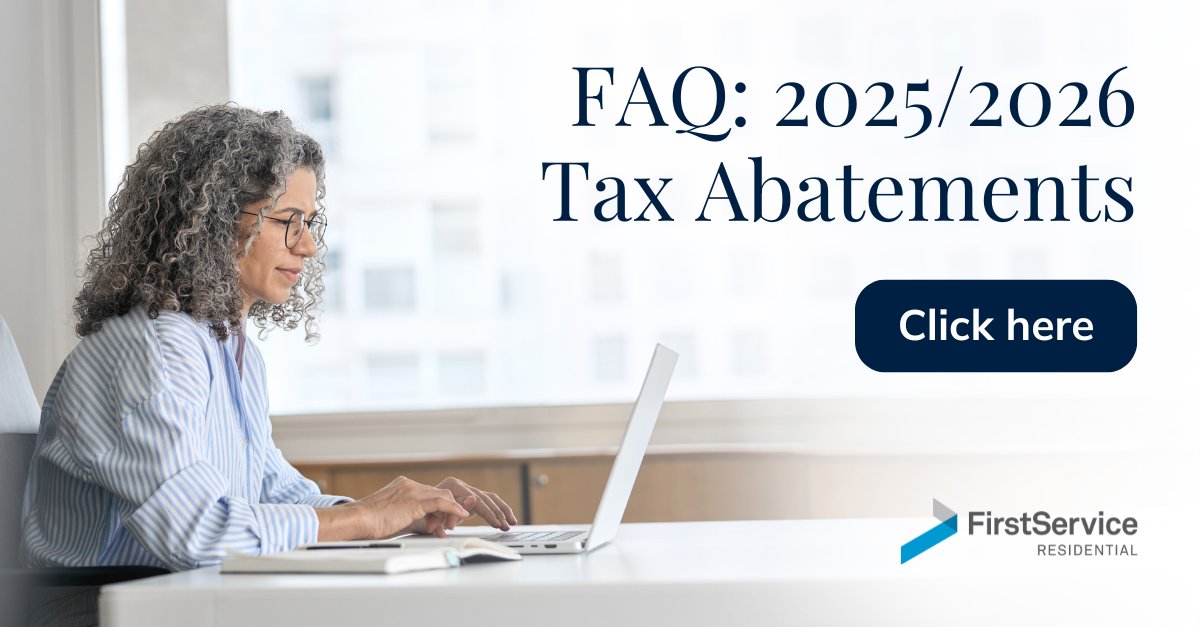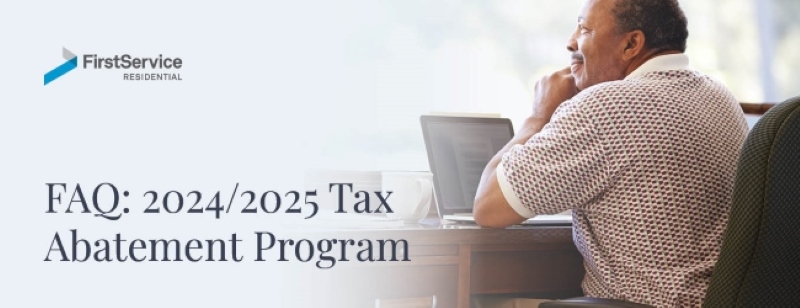Friday December 01, 2023
UPDATE: This article does not pertain to the latest tax abatement cycle. Click here for 2025/2026 tax abatement updates.

The annual Cooperative and Condominium Tax Abatement Program is an opportunity for New York City shareholders and unit owners to reduce their property taxes. The tax reduction, known as an abatement, is based on the average assessed value of the residential units that comprise an individual building. The co-op or condo's board or managing agent is responsible for applying for the abatement on behalf of the entire development or building.
As mortgage interest rates, insurance, and utility costs continue to rise, we encourage all owners and shareholders to pursue an abatement to offset their expenses. Our experts answered the most frequently asked questions to help you navigate requirements for the 2024-2025 tax abatement cycle.

What are basic requirements for owners and shareholders to be considered eligible for the 2024-2025 tax abatement program?
The New York City Department of Finance (DOF) outlines these basic requirements for eligibility:- The apartment must be used as your primary residence.
- If more than one individual owns the apartment, at least one apartment owner of record must use the apartment as their primary residence.
- You do not own more than three residential units in any one development.
- You have filed a real property transfer tax form or deed with the Division of Land Records at www.nyc.gov/acris.
- This requirement applies to condominiums. The filing is typically completed at the time of purchase, often by a title company or attorney on your behalf.
- You are not receiving the clergy property tax exemption.
- The unit is not owned by a business, such as an LLC, or held by a sponsor or their successors in interest.
- An apartment owned by a trust is eligible only if the apartment is the primary residence of all the beneficiaries of the trust, trustee(s), or the life estate holder(s).
What is the deadline to submit 2024-2025 tax abatements?
The Department of Finance will accept new tax abatement applications and renewals through February 15. However, we strongly encourage applicants to submit all required forms to their managing agent well before the deadline to allow adequate review time, any necessary corrections, and submission.**FirstService Residential utilizes an online portal to simplify the application and review process for all our clients. We require all owners and shareholders to complete submission via our secure Tax Abatement Submission Portal by December 31.
Upon completion of the form, you will receive a notification that indicates your submission has been received.
Who determines if an owner or shareholder will receive the tax abatement?
While timely filing with the DOF is an essential component to the tax abatement process, the DOF – not your managing agent – makes the ultimate determination if an owner or shareholder will receive the abatement.If I am eligible for the abatement program, when will I receive the credit?
The distribution of approved abatement credits is determined by DOF. Cooperative shareholders receiving the abatement can expect to see the annual credit on their maintenance bill when approved by the co-op’s board. Shareholders should note that certain boards impose an assessment at the same time. Condominium owners who are enrolled in the program and are receiving the abatement can expect to see the credit on either their quarterly or semiannual tax bills issued by the city.I own multiple units but only received a notification for one apartment. How do I respond for my additional apartments?
If your apartments are not legally combined (one maintenance/common charge statement), you need to respond for each unit that you use as a primary residence.Do I need to submit a response for my parking or storage space?
No, only residential apartments are eligible for the abatement program.What is “prevailing wage” and how does that impact eligibility for tax abatements?
Condominium and cooperative buildings in New York City are required to pay building workers a prevailing wage or forfeit their eligibility for the Cooperative and Condominium Property Tax Abatement for the upcoming tax year. The bill was signed into law by Governor Kathy Hochul in September 2021 and specifically applies to multifamily condominium and cooperative properties with an average assessed value of $60,000 or more.If the building has less than 30 units, the average assessed value per unit must be more than $100,000 for the prevailing wage requirement to apply. For a condominium property, the average assessed value is the sum value of all units divided by the total number of units. For co-ops, a single average assessed value is assigned to the entire building.
Buildings with 32BJ-affiliated employees are already in compliance with prevailing wage requirements.
Click here to learn more about the impact of the Prevailing Wage Law on New York City condos and co-ops.
What happens if my building decides to opt-out of paying prevailing wage?
Buildings are required to pay prevailing wage to remain in the abatement program. If your building opts-out of paying prevailing wage for the upcoming tax year, shareholders and owners will not be eligible for that year. The building can decide to opt-in for future years and shareholders and owners that meet all necessary criteria will become eligible for the abatement.What personal tax exemptions and abatements are available to seniors, veterans, people with disabilities, clergy members, and STAR (School Tax Relief) benefit homeowners?
To qualify for these distinct exemptions and abatements for property taxes, the homeowner must apply directly on this page.Senior Citizen Homeowners’ Exemption (SCHE)
- All owners must be 65 or older—or, if you own your property with a spouse or sibling, at least one of you must be 65 or older.
- The property must be the primary residence of all owners and their spouses. However, if an owner or spouse resides elsewhere, the property may still be eligible if that owner is receiving medical care in a healthcare facility or is absent due to divorce, legal separation, or abandonment.
- The total combined income of all owners and their spouses, regardless of where they live, must be $58,399 or less.
- You must have owned the property for at least 12 consecutive months prior to filing an application.
New York State Veterans Exemption
- The Veterans Exemption is available to certain veterans, spouses/widow(er)s of veterans, and Gold Star parents. The deadline to apply is March 15.
- Exemptions are available to veterans who have served in the U. S. Armed Forces, including the U.S. Army, Navy, Air Force, Marines and Coast Guard.
- Obtaining a Veterans Exemption is not automatic. If you're an eligible veteran, you must submit the initial exemption application form to your assessor.
Disabled Homeowners’ Exemption (DHE)
- The DHE benefit is available to property owners with disabilities and an annual income of $58,399 or less.
- The DHE benefit must be renewed annually.
- The deadline to apply for DHE for the current tax year, or to renew the benefit, is March 15.
Clergy Exemption
- The clergy exemption is available to eligible retired or active clergy members and their spouses or unremarried surviving spouses.
- The deadline to apply is March 15.
- This clergy exemption does not apply to cooperatives.
Basic and Enhanced STAR Credit
- Current recipients of the STAR property tax exemption can continue to receive it.
- New applicants must apply to the state for the credit.
- The credit is available to households with an annual income of $500,000 or less.
- If eligible for STAR benefits, the abatement will be received as:
- A STAR exemption (reduction on your school tax bill); OR
- A STAR credit (paid by check or direct deposit)
Supporting our properties with unmatched resources
New York City’s web of local laws and regulations is increasingly complex, often requiring expertise that falls outside the purview of a property manager. At FirstService Residential, our property managers have the support of an in-house network of subject matter experts and third-party consultants who are regarded as the industry’s brightest leaders. Our experts include Michael Wolfe, president of property management at FirstService Residential, who also serves as president of REBNY’s Residential Management Council. Ben Kirschenbaum, our general counsel, is also an active member of the REBNY Council and works with New York City legislators and attorneys to help shape and protect the interests of condominium and co-op boards across the region. Both are actively communicating with the city’s Department of Finance regarding the promulgation of the new rules to enforce the changes in the law.Additional in-house experts include:
- 2023 Insurance Market Trends: General Liability and Umbrella Policy Limits
For three years now, underwriters and insurance professionals serving condominiums and cooperatives have struggled to obtain general liability and umbrella policy terms that adequately protect their clients, and in many ways, this has worsened. Despite national volatility across all property and umbrella insurance products, there are a few remaining alternatives for boards to secure excess liability policies that adequately mitigate risk and make sense for building budgets. Read more.
- Budget Preparation and Implementation
Now, more than ever, it's crucial for boards to make strategic financial decisions to protect their properties from marketplace volatility and inflationary pressure. To help guide our boards, FirstService Residential’s in-house financial and management experts answered the most frequently asked questions about the current economic environment, potential impacts on building operating budget planning, reserve funds, and the role a property manager plays in the budget process for condos and co-ops. Read more.
- Local Law 97: 2023 Updates from the New York City Department of Buildings
The Climate Mobilization Act (CMA) sets annual emissions standards (carbon limits) for all buildings 25,000 gross square feet and above beginning in 2025. Beginning May 1, 2025, every building will need to submit whole-building annual data from the previous calendar year. If the building goes over its emissions budget/cap, a fine will be assessed on the property. Our in-house energy and emissions experts can help your building comply. Read more.
- Tax Certiorari and Protest Services
Our clients have access to the experts at Goldstein Weprin Finkel Goldstein, a premier tax certiorari firm. This partnership has enabled our clients to save millions of dollars on real estate tax assessments, as well as the legal fees associated with tax protests. Read more.